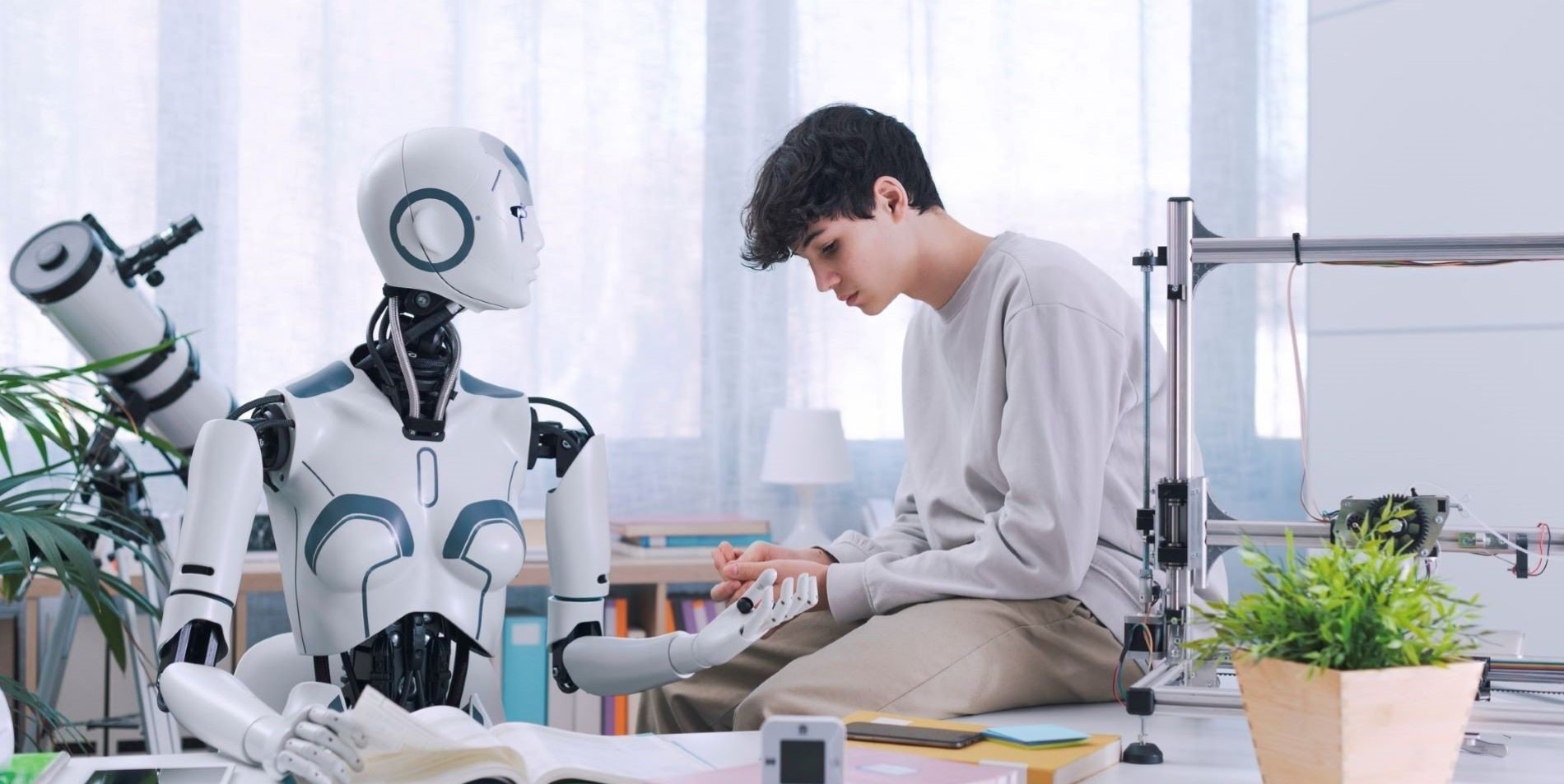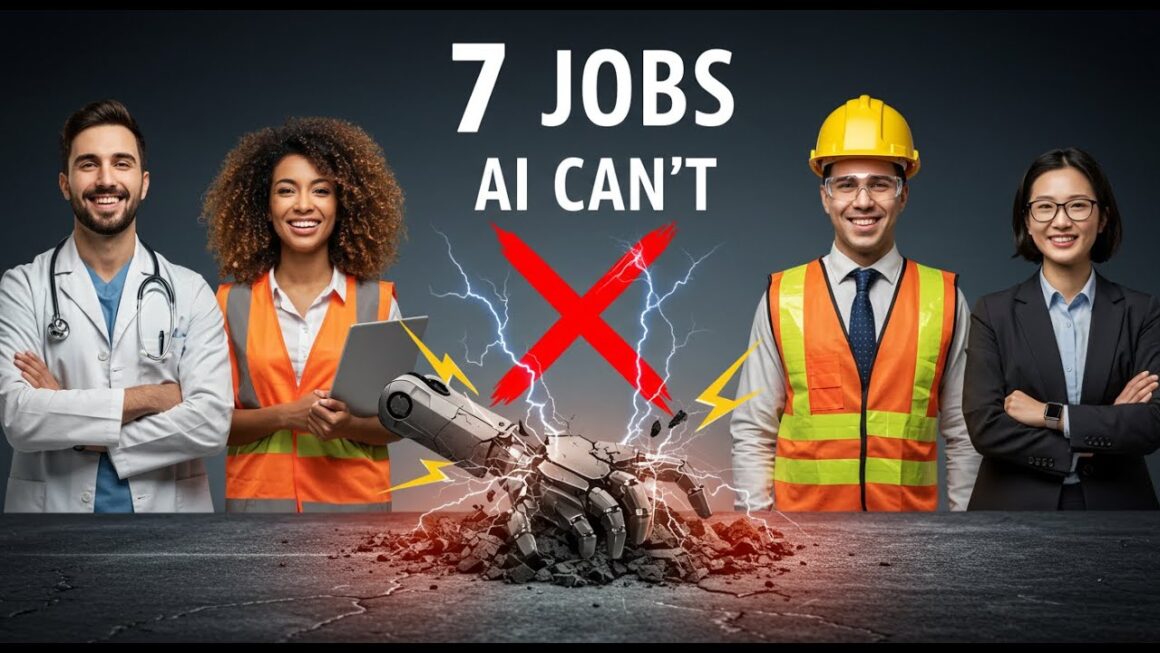AI Is Replacing Traditional Jobs: Here Are 7 Skills That Can’t Be Automated
In a world where Artificial Intelligence (AI) is advancing at lightning speed, many feel their jobs especially traditional roles—are under threat. According to analyses, up to 50% of certain job tasks may be automated within the next decade. Yet, despite this wave of change, human beings aren’t obsolete. In fact, some skills are proving irreplaceable. In this post we’ll explore why AI is replacing traditional jobs and why there are 7 key skills that can’t be automated. If you understand these, you’ll not only survive the shift you’ll thrive.
Why AI Is Replacing Traditional Jobs
 Fully Funded Scholarships Without IELTS, TOEFL or SAT | Study Abroad 2025
Fully Funded Scholarships Without IELTS, TOEFL or SAT | Study Abroad 2025
Traditional jobs often involve repetitive, rule-based, predictable tasks—the very types of work that AI and automation are excellent at. For instance, the World Economic Forum notes that jobs with high “automation applicability” tend to involve data gathering, summarizing and routine decision-making. (World Economic Forum)
Here’s a breakdown of how this tends to happen:
- Routine and repeatable tasks: These are easiest for machines to learn.
- Large data-driven environments: When tasks are heavily based on patterns, AI can step in.
- Cost pressures: Automation is often seen as a way to reduce labour cost and increase scalability.
- Global competition: As companies seek efficiency, roles that can be automated get replaced or transformed.
That means many traditional roles clerical, basic accounting, data entry, even some customer-service jobs are at risk. It doesn’t mean every job will disappear, but the nature of work is shifting. And that’s where the opportunity comes in: developing the skills that can’t be automated. According to one survey, skills like communication and leadership rank high among traits that AI cannot fully replicate. (newsroom.wiley.com)
7 Skills That Can’t Be Automated
Below are seven human skills that are proving to be automation-resistant. These are the things machines struggle with—because they are deeply human, complicated, emotional or intuitive. If you focus on developing these, you’ll build resilience in your career.
1. Emotional Intelligence (EI)
Emotional intelligence means understanding, managing, and using emotions—both your own and other people’s. AI can simulate responses, but it can’t genuinely empathize. One article explains this as a foundational human skill AI struggles to replicate. (edvisors.com)
Why it matters:
- In leadership, mentoring and customer-service roles, EI builds trust and connection.
- Humans prefer interacting with humans when emotions or ethics are involved.
- When a task requires reading body language, tone and personal history, human judgment wins.
2. Creativity & Innovation
Machines are great at following rules and generating variants of what they’ve seen—but they struggle with true originality: new ideas, disruptive innovation, art, nuance. The ability to generate something entirely new is a deeply human trait.
Why it matters:
- Marketing, design, strategy roles demand creative thinking.
- When environments change, creativity helps humans adapt; machines often need retraining.
- Unique human experiences fuel new ideas—machines can assist but not originate in the same way.
3. Critical Thinking and Complex Judgment
When problems are messy, ambiguous, or ethically complex, human judgment matters. AI may assist with data, but humans must decide. For example, in healthcare or law, decisions often require weighing values, context, and exceptions.
Why it matters:
- Many jobs will evolve into human + AI collaboration not human replaced by AI.
- Being able to interpret data, ask the right questions, and make decisions gives you an edge.
- In volatile or unprecedented situations, humans still outperform machines.
4. Ability to Lead, Influence and Inspire Others
Leading a team, motivating people, creating vision these aren’t tasks machines excel at. AI might suggest strategy, but it doesn’t inspire. One career guide states that leadership remains automation-proof because of its human dimension. (paybump.com)
Why it matters:
- Organizational culture, morale, change management rely on human interaction.
- Humans look up to other humans as role models not to a machine.
- Influence, persuasion, and adaptability in a team context are difficult to automate.
5. Social and Interpersonal Skills
Your ability to communicate, negotiate, teach, collaborate, adapt socially these are core human strengths. Even as AI tools expand, survey data show interpersonal skills remain high in demand and low in automation risk.
Why it matters:
- Remote work, multicultural teams, client-facing roles all rely on human social competence.
- Machines can assist scheduling or messaging but cannot replace nuanced human interaction.
- Jobs in service, counselling, people operations will still need human touch.
6. Adaptability & Learning Agility
The world is changing rapidly new tech, new business models, new problems. The ability to learn how to learn, pivot, adapt, and grow is inherently human. AI cannot anticipate your career path or reinvent you the way you can.
Why it matters:
- Roles will keep evolving being able to acquire new skills will protect your career.
- When disruption comes, adaptability lets humans shift to what only we can do.
- Companies value agile thinkers who can move between roles and contexts rather than rigid automation.
7. Ethical Reasoning & Moral Judgment
Finally, many decisions aren’t just technical they’re moral. AI can analyze data, but it doesn’t possess conscience. If you’re dealing with decisions that affect human well-being, fairness, values or trust, you’re in the human domain.
Why it matters:
- As AI tools become pervasive, companies will need people who ensure fairness, ethics, transparency.
- Regulation, trust, ethics are growing fields where human reasoning is foundational.
- Being the person who asks “should we do this?” rather than just “can we do this?” gives you a unique role.
How These Skills Map to Jobs & Why They Matter
To help you visualize how this plays out, here’s a table comparing routine/automatable skills vs human-only skills (the 7 above), and types of jobs that map accordingly.
| Automatable Skills (High Risk) | Human-Only Skills (Low Risk) | Sample Jobs Leveraging Human Skills |
|---|---|---|
| Data entry, repetitive computation | Emotional intelligence, leadership | Therapist, HR manager, team leader |
| Report generation, simple customer queries | Creativity, innovation | Creative director, product designer, marketing strategist |
| Basic legal/medical research | Complex judgment, ethical reasoning | Senior attorney, healthcare ethics consultant |
| Routine technical support | Social and interpersonal skills | Community manager, client partnerships lead |
| Fixed-process manufacturing | Learning agility, adaptability | Change manager, innovation strategist |
The significance? As AI continues to advance, jobs anchored in the “automatable skills” side will be increasingly challenged. Meanwhile, those rooted in the “human-only skills” side will become more valuable.
What You Should Do to Develop These Skills

Recognizing these 7 skills is one thing but developing them is another. Here are practical steps you can take:
- Self-reflection: Which of these skills come naturally to you? Which do you want to improve?
- Seek experiences that stretch human skills: Lead a group, teach someone, volunteer in a culturally diverse setting.
- Get feedback: Emotional intelligence and social skills improve with feedback from peers or mentors.
- Learn broadly: Creativity thrives on diverse experiences. Read beyond your discipline, travel (even locally), explore new cultural contexts.
- Mentor or be mentored: Leadership and influence grow when you engage with others in guided roles.
- Stay curious and adaptable: Take new online courses, pick up new hobbies, explore unfamiliar fields build learning agility.
- Engage with ethics: Read about emerging AI ethics, data privacy, societal impacts. Reflect on moral questions in your domain.
Why It Matters, Especially Now
Here’s why mastering these skills matters right now:
- AI is not just a future risk it’s reshaping roles today. As one report says: “AI skills are becoming more important than job experience.”
- Employers increasingly value human skills because they recognize machines isn’t the full picture humans provide the nuance, empathy, creativity.
- If you only build technical skills that can be automated, you risk being replaced, not complemented. But if you build human skills, you’ll be the complement.
- For students and early-career professionals: building these skills early gives you a head-start. It’s not just about surviving it’s about thriving in the next era of work.
Conclusion
Yes AI is replacing traditional jobs in many sectors, and yes automation is moving fast. But here’s the hopeful part: there are human skills that AI simply can’t replicate, and they’re going to be more valuable than ever. By focusing on emotional intelligence, creativity, judgment, leadership, interpersonal skills, adaptability and ethics, you’re not just riding out the change you’re becoming what the future needs.
If you’re wondering what to do next: pick one of these skills you feel you’re strong in or want to improve. Make it a personal project. Seek opportunities to practice it. Then build on that. Because while machines may take over tasks, they won’t take over you not when you embrace the traits that make you unmistakably human.








2 comments
Your article helped me a lot, is there any more related content? Thanks! https://accounts.binance.info/es-MX/register?ref=GJY4VW8W
Yes there are more related contents, feel free to browse through our website for more interesting related contents.
If you don’t see any, you can specifically request for what you want and we will surely assist you.